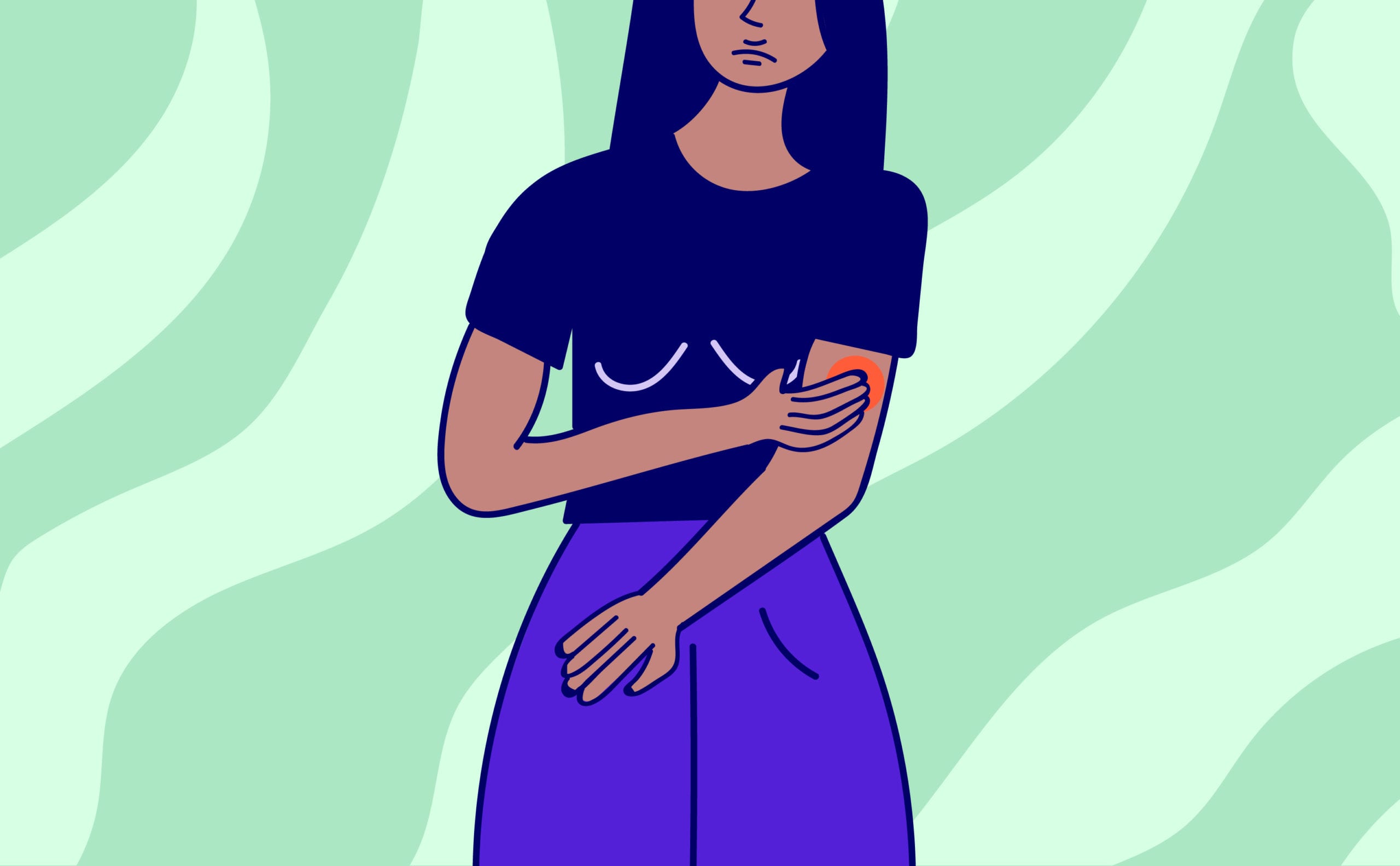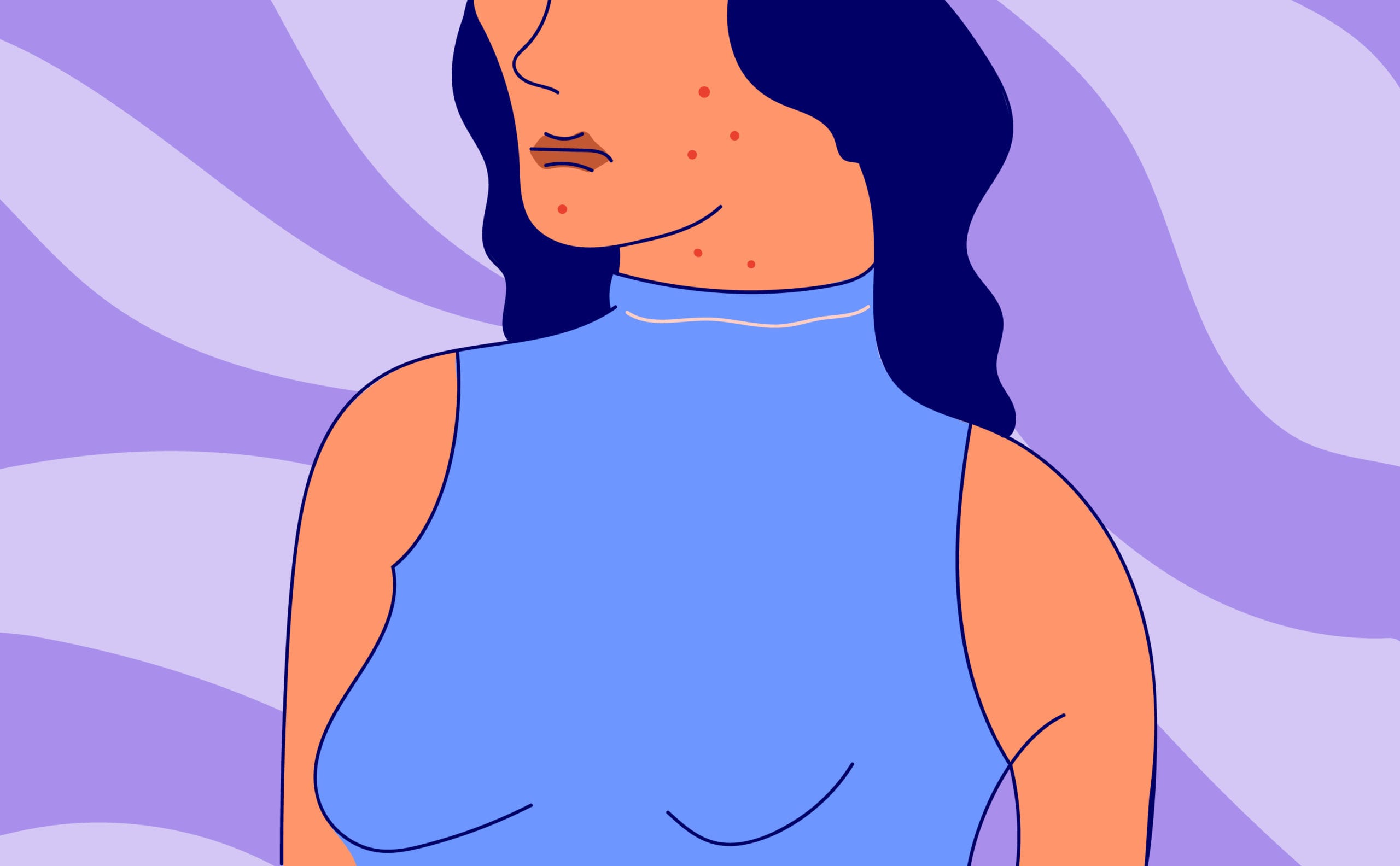We’re all about equipping you with the know-how to understand your symptoms, and we especially emphasize the specific, tangible ways to manage them. Our goal is to empower YOU to take charge of your menopause journey, starting today.
A quick note about product recommendations…Elektra Health is not paid to feature any products. We just like them and think you might too, though we can’t guarantee any results.
Lifestyle
Nutrition & Diet
Some food leads to inflammation which, in turn, affects our skin health. When we say “inflammation,” we’re referring to our body’s normal response to infection or injury. It’s what causes damaged tissues to release chemicals that signal to white blood cells that it’s time to start repairing — which is totally a good thing and exactly what we want to happen when there’s an injury.
What we DON’T want, however, is for the inflammation to become chronic and spread throughout the body, because then it can cause damage to your skin, in addition to increasing your risk of heart disease, stroke, cancers, diabetes, and more.
There are certain tried-and-true nutritional tenets that our founding physician, Dr. Anna Barbieri, MD recommends to keep inflammation at bay and help mitigate the symptoms of dry, itchy skin during menopause:
- Limit added sugar, including high fructose corn syrup, and artificial sweeteners
- Limit foods with inflammatory action, such as conventionally raised meat, unhealthy fats (trans fats & processed vegetable oils), dairy, and gluten. Nightshade vegetables (eggplants and peppers) can be inflammatory too, so you may want to consider limiting those as well. You may consider trying a few weeks of an elimination diet – essentially, you remove these foods from your diet, and if there is an improvement in symptoms, you add the foods back in, one group at a time. This helps you figure out which food was causing you problems.
- Stick to the healthy oils: olive oil, flaxseed oil, walnut oil, hemp seed oil, and unrefined organic expeller-pressed grapeseed oil
- Hydrate, hydrate, hydrate! When our urine is pale and clear, that’s a sign we’re properly hydrating our skin from the inside
For more on what foods raise the risk of inflammation and impact complexion, refer to our guide to acne during menopause, as well as our comprehensive nutrition guide.
Holistic Practices
Healthy skin starts with a basic (but effective!) skincare regimen that’s, above all, sustainable. Here’s what we recommend:
It goes without saying: sun protection is a MUST.
If possible, avoid being outdoors during the peak midday hours, wear a wide-brimmed hat if you can, and always, always, always wear sunscreen with a 30+SPF.
When looking for skin care products, keep an eye out for the following ingredients:
Vitamin C (Ascorbic Acid)
This potent antioxidant protects the skin from free radicals, which break down the skin cells and cause fine lines and wrinkles. It also acts as a shield to protect the skin from sun damage. Apply in the morning after washing your face.
Hyaluronic Acid
When it comes to hydration, hyaluronic acid takes the cake. It helps increase skin’s thickness while reducing the appearance of fine lines and wrinkles, speeding wound healing, and regulating levels of inflammation.
Retinol
Retinol is an antioxidant that works to naturally boost collagen production and, in turn, help the skin maintain thickness, produce oils, and retain moisture.
Niacinamide
Niacinamide, aka vitamin B3, is a potent antioxidant that helps reduce water loss in the skin, which may help improve its elasticity.
Phytoestrogens
Emerging research also suggests that, when applied topically, certain phytoestrogens mimic the effects of estrogen by supporting collagen synthesis. Further research and exploration are needed. we’re always keeping an eye out for new menopause-related science and will be sure to let you know if/when we hear more about topical phytoestrogens!
Supplements & Over-the-Counter Solutions
Supplements and over-the-counter supplements may be effective in supporting your skin health…if you choose wisely. We recommend consulting with your healthcare provider first to ensure you’re using something with optimal efficacy and safety (i.e. backed by clinical research) or consulting with Elektra’s providers. Here’s a quick primer from our team on how to go about selecting high-quality supplements.
Curcumin
Curcumin is a spice derived from the boiled, dried, and ground root of the Curcuma longa plant. It’s what constitutes turmeric, the anti-inflammatory, antioxidant-rich spice that’s fittingly referred to as “Indian gold.” Studies show that it may help reduce the signs of aging.
coQ10
coQ10 is an enzyme involved in the metabolism of our mitochondria (the powerhouse of the cell). It acts as an antioxidant to protect the cell from damage and may be helpful in reducing fine lines.
Niacin
Niacin, known more commonly as vitamin B3, is an antioxidant that helps reduce oxidative stress, which refers to a type of stress affecting the functioning of our cells. It can also help increase the number of healthy lipids in our skin called ceramides.
Collagen
As natural levels of collagen decline, some choose to take a supplement to boost skin health and reduce the signs of skin aging. There are data from several small studies that show collagen supplements may improve aging’s effect on skin, including decreasing wrinkles and improving elasticity and dryness.
Silveesa
Bonafide’s newest research-backed line, Silvessa, specifically targets hair and nail health with a skin serum, hair serum, and an oral supplement.
Prescription
Hormonal
Estrogen has a direct effect on the physiology of our skin cells. It can increase hydration and elasticity while reducing the appearance of wrinkles, which is why hormonal therapies are a viable option for the management and treatment of dry, itchy, and estrogen-deficient skin.
However, studies on the use of hormonal estrogen for skin health have focused on topical applications only. With concerns around the safety of topical estradiol, more research is needed to support its use.
For more information, refer to our complete guide to hormone replacement therapy (HRT).
We’re always keeping an eye out on emerging research and the latest clinical studies. Subscribe to our weekly Elektra Digest for the latest, science-based info direct to your inbox. Something work well for you that’s not listed here? We want to hear it! Shoot us a note at [email protected]. (We’re human, promise.)
Pro tip #2
If you live in a dry climate or a place with long winters, keep a humidifier handy to help ease the symptoms of dry skin and irritation. There are miniature models to fit right on your desk, larger ones for entire rooms/apartments, and even silent ones that won’t disrupt your sleep.
Disclaimer: This information is for general educational purposes, and should not be used as a substitute for medical advice, diagnosis or treatment of any health condition or problem.
As with anything you put into your body, taking dietary supplements can also involve health risks. You should consult a medical professional before taking supplements and inform your doctor about any supplements, as well as any medications you already take, since there may be interactions.
Helpful? Share the wealth!
Share with a friend who deserves evidence-based expertise &
solutions.






